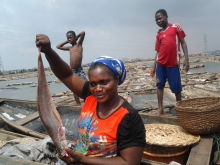“There must be a time when we sit back to reflect on the things we take for granted in order to avoid being taken by surprise when such things disappear.” These were the opening words from the welcome remarks by Nnimmo Bassey, Director, Health of Mother Earth Foundation, at the FishNet community dialogue at Makoko, Lagos State.
24th July, 2017 is a day Makoko community will remember as they hosted Health of Mother Earth Foundation’s FishNet Community Dialogue with the theme: Fish Not Oil there. The socio-ecological diagnostic exercise for coastal and non-coastal communities helps to identify their natural assets, peculiar environmental challenges and concerns and to chart a course for remediation, restoration and protection of their environment and ecosystems that may have been degraded and despoiled by “corporate” actors in the extractive and other sectors.
Makoko, an informal settlement/town, is divided into Makoko on water (AkoAgbon, Adogbo, Migbewhe and Yanshiwhe) and Makoko on land (Sogunro and Appolo) is very rich in culture and biodiversity but these cultures and biodiversity are threatened by oil spills, dredging and land reclamation activities. They also have a displacement threat by government and speculators intent on grabbing their strategic waterfront location.
The participants were community fisher men and women, civil society organizations and the media.
The Dialogue
The dialogue was an interactive session with participants working in three groups. Participants reviewed what the state of their coastal community environment was before the pollution, reclamation and dredging activities started and how badly and despoiled their environment has turned out to be.
Mr. Akinruntan Oluwagbenga stated that as a fisherman who depends on fishing for livelihood, things were okay until the water got contaminated by oil spills and other industrial pollutants. He recalled how a 1998 oil spills from Mobil’s offshore platform in Akwa Ibom State spread to Lagos and killed aquatic resources and destroyed his fishing equipment. The oil from the January 12, 1998 spill traveled all the way from Akwa Ibom state to Lagos State. A sheen of oil was seen on the coastal areas of Cross river state, Akwa Ibom state, Rivers state, Bayelsa state, Delta state, Ondo state and Lagos state.
“In the past we caught croaker, titus, catfish, sinus, crabs, lobsters and crayfish,” recalled Mr. Oluwagbenga. “Today there is scarcity of these species and this has affected our source of income and ability to cover the welfare needs of our families.”
Mrs. Beatrice Ageh while speaking said that she moved from Ikoyi to Makoko, stating that in the past before the dredging started, fish was readily available. She stressed that as a fisher woman, all she knows to do is to fish and the companies causing the pollution that is ravaging their coastal environment and their livelihood need to stop.
Mr. Ebenezer Julius, vice chairman of the fisher men and women in the area, lamented, “we used to have great catch even without going deep into the sea.” He explained that the National Inland Waterways authority (NIWA) saddled with the primary responsibility of improving and developing Nigeria’s inland waterways has failed as sand mining and dredging of their fishing areas is what the government focuses on. “NIWA no longer cleans up dirt and trash from our rivers as they used to do in time past. Our fishing grounds have been destroyed by chemicals. Add to this the tragic push by the government to destroy their community and render us refugees in our land.”.
Another fisher woman, Mrs. Femi Oladunjoye, reiterated that crayfish, akpoagbo and owele which used to be abundant in the community is now scarce and they now have to buy fresh fish from other markets to meet local demand.
Mr. Damilohun Asowonrevealed that the there were up to 20 dredging companies operating in the area and that they were the big culprits disrupting their fishing. He regretted that the companies do not care about the impacts on the communities.
According to Mr. Mohammed Zanna, “Fishing is our asset but now we are thrown out of business by the actions of the dredging companies, oil companies and chemical companies. To catch a fish now you need to travel deep into sea with an expensive outboard engine fishing boats and net unlike the olden days when we only had to paddle in dug outs to catch fish.”
Dialogue Resolutions
At the end of group discussions, reports were made to the assembly and the following action points and resolutions were agreed upon:
We cannot drink oil but we can eat fish. We want fish, not oil
Oil spills must stop and our polluted water must be cleaned up now starting from the Niger Delta where they come from.
We demand compensation from the government and the oil companies for these atrocities.
We demand an immediate stop to the dredging activities in our communities.
Health care center should be provided for the community.
Government should stop the displacement of our community people and the reclamation of land from of our rivers.
We deserve to enjoy social amenities like the other parts of Lagos State.
Government should invest in our fishing by providing boats, strong fishing nets and grants because we have the capacity to meet the demand for fresh fish in Nigeria and stop importation of frozen fish.
Fisheries employ millions of Nigerians whereas oil companies and the dredging companies only employ a handful of people. Our services and contributions to Lagos State economy should be recognized and supported.
We endorse and join The FishNet alliance and support similar networks sustained and maintained in solidarity for the poor fisher folks at the risk of extinction because of corporate and government aggression.
The media was also charged to join in the fight for a better environment and to report accurate environmental challenges to the world.
Written by By Oduware Stephen, Project Officer, HOMEF.





